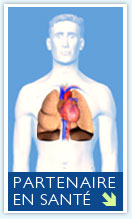- Info générale
- Os et articulations
- Maladies de cœur
- Cerveau et santé mentale
- Rein et infections urinaires
- Douleur
- Webémissions archivées
- Articles sur la santé
- Outils santé
- Soutien communautaire
- Affections apparentées
- Produits de santé naturels associés
Santé des aînés
Ostéoporose : qui est touché ?
All of us will get osteoporosis if we live long enough. Since none of us have a crystal ball to predict our life expectancy, we should all do our best to ensure good strong bones and prevent falls no matter how long we live.
Osteoporosis is extremely common. It is estimated that by age 50, 1 in 4 women and 1 in 8 men will have osteoporosis. Osteoporosis causes 70% to 90% of the 30,000 hip fractures that occur every year in Canada. Men typically have a higher peak bone mass, so it takes longer for bone loss to reach a level where the bones fracture. Nevertheless, as men increasingly live past age 80, osteoporosis is going to become a more common problem for men.
Research has identified a number of risks that make it more likely for one individual over another to get osteoporosis.
If several of these risk factors apply to you, you may want to check with your doctor about how to prevent osteoporosis.
Risk factors for osteoporosis we cannot change:
- genetics (family history)
- female sex (osteoporosis affects women more than men)
- age (even if we keep saying we are 39, our bone mass decreases with age)
Lifestyle risk factors for osteoporosis we can change:
- low dietary calcium and vitamin D
- little or no exercise
- smoking
- excess alcohol use
- low body weight (less than 60 kg) or weight loss of more than 10% since the age of 25
Medical conditions and medications that increase risk of osteoporosis:
- anorexia nervosa
- thyroid disease (overactive thyroid or excess thyroid supplements)
- parathyroid disease (overactive parathyroid glands)
- long-term use of corticosteroids (e.g., cortisone, prednisone)
- use of aromatase inhibitor (for breast cancer)
- use of androgen deprivation therapy (for prostate cancer)
- liver or kidney disease
- rheumatoid arthritis
Medical conditions in women:
- estrogen deficiency (surgical removal of ovary)
- early menopause (before age 45)
- irregular periods
Medical conditions in men:
- testosterone deficiency (gonadal or testicular failure) measured by an early morning testosterone level (blood test)
If you find that a number of these risks apply to you, you may want to think about making some simple changes in lifestyle, doing a test for osteoporosis or even starting medications that are available.
The risk factors of family history, female sex, and advancing age are powerful predictors of osteoporosis.
If you have these risks, then a bone density test can more accurately predict if osteoporosis is present.
The other risk factors for osteoporosis should be assessed as well and modified for their own sake, if possible. Each added risk factor contributes towards the suspicion of osteoporosis. One or more risk factors might be reason enough to proceed to a bone density test.
original article by John P. Wade, MD
with revisions by the MediResource Clinical Team
Vous cherchez quelque chose dans notre site Web ? Vous l'avez trouvé ?

